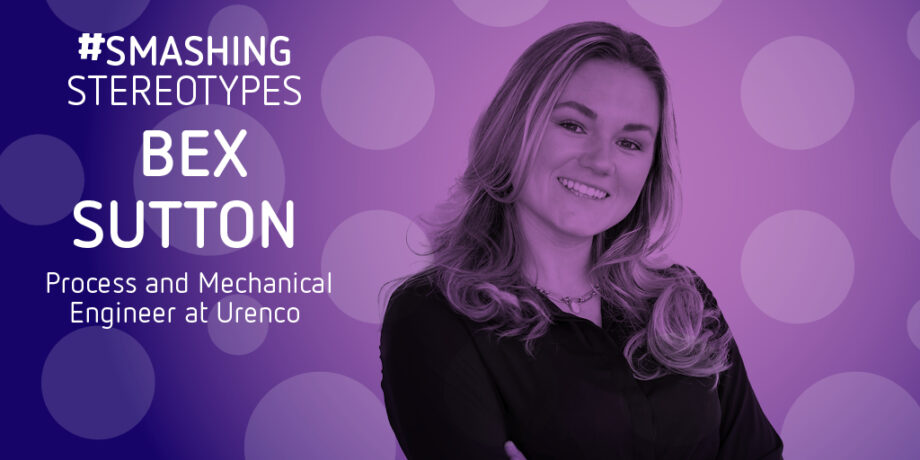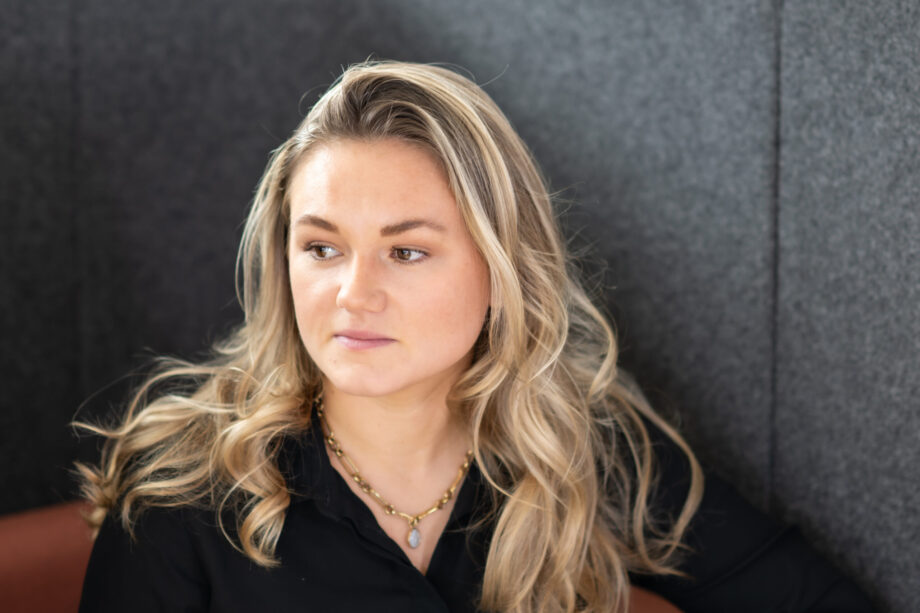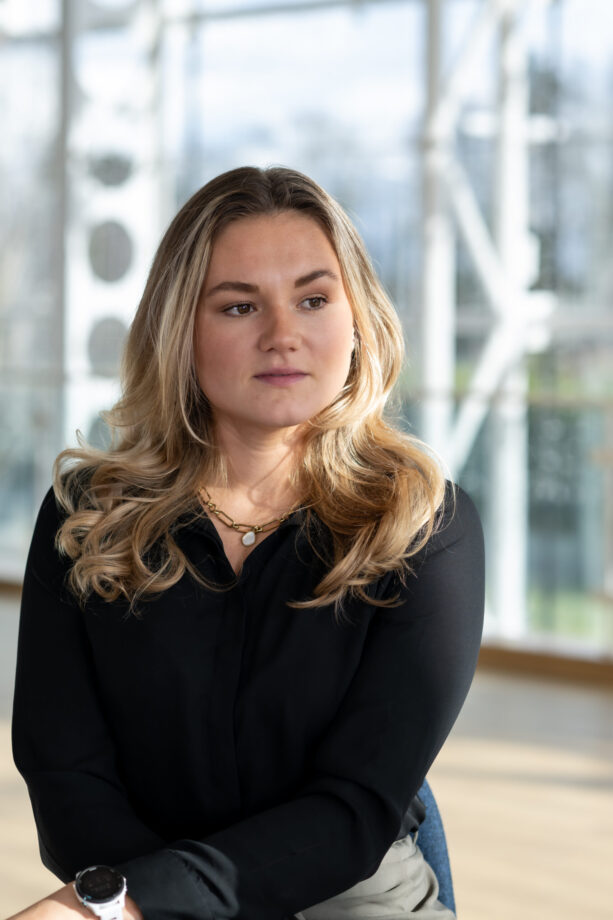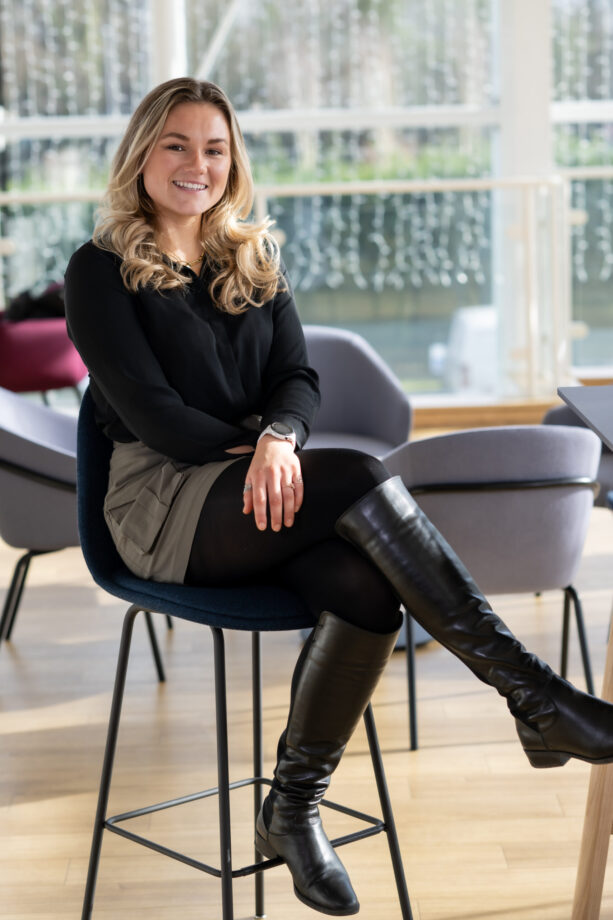
Bex Sutton
Process and Mechanical Engineer at Urenco
Developing sustainable energy solutions with global impact
Bex Sutton is a process and mechanical engineer passionate about sustainable energy. Inspired by open water swimming, she pursued chemical engineering, becoming the first in her family to go to university. Her career spans renewable power, yacht engineering, and uranium enrichment at Urenco.
Protecting the environment was important to me from a young age
I grew up as a competitive swimmer, training in both the pool and open water. I remember being fascinated about why some objects float and others sink. The open water swimming also highlighted the importance of protecting our environment from pollution. This interest to understand how every day processes work and how to develop these processes without damaging the environment is what inspires my enthusiasm towards STEM.
From graduate engineer to an international career
I studied science and maths at A-levels and was very sporty at school. When I first told my group of girls at school that I wanted to study engineering, they joked that I always acted like a boy. From 2014 to 2018 I studied chemical engineering at Newcastle University, one of the first generation in my family to go into higher education.
I graduated with a first class Master’s degree in Chemical Engineering with Sustainable Engineering Honours. I chose to specialise in sustainable engineering due to my strong interest in sustainable energy solutions and I knew this is where I wanted my career to take me.
After graduating I completed a graduate scheme at a power generation company who delivered renewable power plant projects comprising solar panels, heat pumps and CHP engines.
Over the next four years I progressed from graduate engineer to business development manager, where my primary role was to develop a battery energy storage solution (BESS) to bring to market. I helped deliver the companies first ever hybridised heat pump project which won “Project of the Year” at the Association of Manufacturers Power Systems – Awards for Excellence!
I found my career lacked practical engineer experience, hence I chose to leave my office job and work as a yacht engineer in Europe, Asia and the Caribbean. It was a once-in-a-lifetime opportunity and I loved the practical work! However, after two years at sea, I chose to move back home and got a job as a Process and Mechanical Engineer at Urenco. My role involves developing process and mechanical design solutions for the delivery of uranium enrichment projects across our UK, Germany, Netherlands and USA sites.
One of the most exciting moments of my career so far was attending the United Nations Climate Change Conference, COP 21 in Poland, where government leaders discussed climate change issues and global efforts to advance the key Paris Agreement. Both David Attenborough and Arnold Schwarzenegger attended!

STEM develops valuable skills and a global career
Getting a STEM degree has given me skills which are valued across multiple engineering industries, and working in STEM has opened up so many opportunities to work internationally. In little more than half a decade, I’ve worked in Europe, America, Asia and the Caribbean.
I returned to Liverpool and then soon after joining Urenco, applied and was selected to join a team of colleagues from across our European sites working on a voluntary project alongside our day-jobs, with Urenco’s social impact partner Pump Aid. Our challenge was to redesign community and irrigation pumps and help improve the accessibility of water in Malawi.
Part of a bigger picture
Working in the field of sustainable energy is rewarding, however it does have its challenges. I’ve worked predominantly within the UK energy sector for most of my career and I understand the challenges we face as a nation regarding the demand for sustainable energy.
I want to be involved with the development of a sustainable national grid to achieve net zero targets. Nuclear plays a crucial role in providing base load power to support the implementation of other sustainable technologies such as wind and solar.
What motivates me is knowing I’m part of a bigger picture. Each engineer is a little cog in a big machine but working together, we’re helping solve a global problem.
I was the first one in my family to go to university and my parents and I found the application system all very overwhelming. There’s so many steps we were all unfamiliar with. Soon after I graduated from university I did some work mentoring other young women going into engineering, checking CVs and personal statements and offering them career guidance.
It’s so important for them to know that, even though they might be in the minority as women, going to university to study engineering is normal and could lead to a really amazing career. I also present at Chester University to give students career guidance and give lectures on chemical engineering modules.

The importance of role models
I’m a big advocate for mentoring, for being there to answer questions, and for showing people what’s available. I want to show that it’s for everyone. It’s possible. There’s clearly financial issues, but I do want to show people that university isn’t a big scary thing. You need to work hard, you need to get the grades, but it really can be done. That world can be accessible to you.
Getting work experience is really important, particularly in chemical engineering. If you have a local plant, try and get some experience – even if it’s just a few weeks – before committing to a four year university course. Go and see what the industry involves, and get something that looks great on your CV. That was a huge help for me – getting three weeks’ work experience one summer on a chemical plant. Not only was it a lot of fun but it’s what, after just three weeks’ shadowing people, made me want to be a chemical engineer.
Even just a conversation can help – spending an hour on the phone with someone who is early-career, asking them questions, can be such a huge help.
My mum’s always been my role model. She’s a small business owner in the construction industry, which is obviously very male dominated. She went completely against the norm entering that industry when she was young, to get the career she wanted. That’s been the biggest inspiration for me. She helped me see that if I want to go into engineering, I can.
